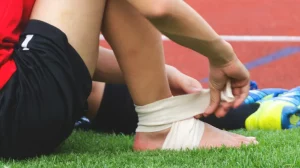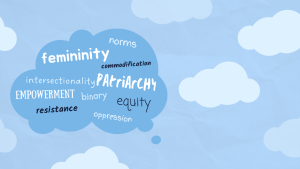1
Section One: The Fundamentals
A) What do we know about sport? What are common assumptions we make about sport and society?
| The idea that sports transcends politics may be untrue for certain people or from a certain perspective can be true for many reasons. One of the main reasons that comes to mind is the discussion of politics in major league sports. Recently in the Superbowl Trump was present, and he was apparently the first president to ever be in attendance at a Superbowl. This became political as Trump’s attendance became a big spectacle, they often panned to him during the game and made a few comments. Drawing attention away from the sport, fans and the players who had worked very hard to make it to this point. People then may take their political opinions on him and associate it with that game, or the team he’s rooting for, whether these opinions are positive or not.
I found the idea of transgender individuals to be surprising for the fact that I have discussed this idea in other classes and was part of a movement to support trans individuals playing rugby. I was surprised because it is a topic that is not often discussed when talking about sports and it was very smart to bring it up. |
Exercise 3: Notebook prompt
What are some other metanarratives about sport that you are familiar with? Find an image or video clip or draw something yourself that captures this idea…
So what? Why does any of this matter? Does it matter? As something we grow up with – live with – play through – we don’t often interrogate the meanings of sport, and perhaps we don’t want to.
But being aware of these assumptions and metanarratives is especially important, I would argue, because of the centrality of sport to our everyday lives, the role that sport plays in shaping our childhood and worldviews and….. [finish that thought]
| A sacrifice for the greater good. When athletes make an extreme sacrifice for success such as pain, relationships, or their health. It portrays athletes as individuals who must give up a normal life in their pursuit of greatness.
…the ways it challenges societal values and norms. Examining these metanarratives helps us see sports as not just games, but as a powerful force shaping how we view success, identity and community.
|
B) What is social justice?
Exercise 4: Padlet Prompt
Think back to the last section and try to look at some of the ideas we discussed differently. How might sport and social justice actually co-exist?
Record any images, video clips, or gifs you added to the padlet and identify a point of intersection between sport and social justice (can be an issue or a barrier or a debate or something you would like to explore in more depth in this course) . Screenshot or paste in your response below.
|
Within the idea of equity and representation it is very important for people or fans to be able to see themselves in a sport. Seeing someone who looks just like you as a POC is important for children and adults. It can inspire people to live their dreams to the fullest and know that they can truly be anything. Esspecially when seeing someone that represents your background, environment or culture do something that is looked at as a respectable profession that can make you happy and make you money.
|
C) Social Justice Reading
(note: this activity is optional!)
D) KINESIOLOGY AND SOCIAL JUSTICE
Exercise 5:
Exercise 6:
What are the implications of bodies-at-risk discourse and the refusal to understand the health gap from a social justice perspective, according to the authors of this article?
| The bodies-at-risk discourse treats certain groups, like POC, women, LGBTQ individuals, and those with disabilities, as if they are naturally unhealthy or lacking something. This way of thinking blames individuals for health problems instead of recognizing the larger social and historical causes, such as racism, poverty and discrimination. By ignoring a social justice perspective, researchers and policymakers continue to focus on what marginalized people lack instead of addressing the unfair systems that create these health gaps. The authors argue that instead of seeing these communities as a problem that needs fixing, research should take an intersectional approach. This can occur by listening to their experiences, and understanding how different forms of discrimination overlaps.
|
Section Two: Sport Feminism
Exercise 7: Notebook Prompt
What is feminism? What does it mean to you? Choose one of the images below and explain how it captures your understanding of feminism (or find one that does speak to you and paste this into your pressbook with an explanation of why it matters to you.
|
Feminism is wanting equality and equity for everyone. To me it means genuinely believing that all people deserve to be treated the same, but also uplifting those who have often been considered lower in our society. The image of the black women next to the chalkboard that says “women power” captures my understanding of women power. I believe that it is able to represent someone who faces many intersectionalities that impact her way of living and that she is trying to advocate for a better future.
|
Exercise 8: Notes Prompt (optional)
NB: Cornell notes is a great resource that teaches effective notetaking. Unfortunately, our system can’t save notes taken in the H5P app, so this is fully optional.
Exercise 9: Crossword Activity
Exercise 10: Padlet Prompt
|
|

|
|



